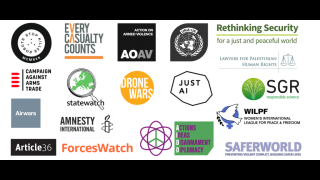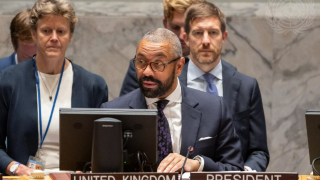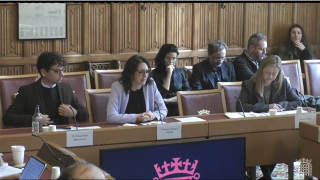
Urgent questions need to be asked around the transparency, accountability and governance of our financial ecosystem. From the spread of terrorism, human trafficking, drugs, corruption to money laundering breaches by major banks - dirty money facilitates a wide range of illegal activities and the UK plays a key enabling role.
Economic crime is rife, but so too is the legal but murky funding of an explosion of AI-enabled emerging technologies that’s turning the science fiction of killer robots into a frightening reality. Technology is often being developed by companies, universities and research institutes, unaware that their creations may have unintended, military applications. Meanwhile, contracts are awarded by the UK Government to developers who are funding and lobbying parliamentary activity, including on issues relating to the regulation of this technology.
Against this background, in January 2022, the UK Campaign to Stop Killer Robots, Transparency Taskforce, United Nations Association - UK (UNA-UK) and Women's International League for Peace and Freedom UK (WILPF-UK) held an event with UK parliamentarians from across the political spectrum to shine a light on the insidious flow of legal money funding potentially harmful tech development and influencing UK policy.
We are delighted that the event saw the participation of multiple members of our network of parliamentary champions as well as broad cross-party calls for action to address the threat of lethal autonomous weapons.
The UK Campaign to Stop Killer Robots together with UNA-UK, WILPF UK and partners will continue to raise awareness around the technical, legal, moral and societal concerns relating to autonomous weapons and advocate for action to address this major emergent security threat.
Please email robotsuk@una.org.uk if you are interested in finding out more about the campaign and follow @UK_robots on Twitter to stay in touch.
Selected quotes from participants
Lord Clement-Jones CBE (Liberal Democrats), Peer and Liberal Democrat Lords Spokesperson (Digital) and member of the UK Campaign to Stop Killer Robots Parliamentary Network:
[UK Defence Minister Baroness Goldie] continuously denied that they use systems that employ lethal force without context-appropriate human involvement. In itself, this is a step further from the original position that it was that the UK does not process fully autonomous weapons systems. So, there is a gradual movement by the UK in the wrong direction…”
...She said that International Humanitarian Law provides a robust principles-based framework for the regulation of weapon deployment and use, which is something most of us entirely disagree with. We know that LAWS are already there, autonomous drones warfare is already a fact of life. Turkish drones in Libya, etc. Of course, the UN Secretary General has taken a pretty firm line on this, saying that autonomous machines with the power and discretion to select targets and take lives without human involvement are politically unacceptable, morally repugnant and should be prohibited by [new] international law. But in the face of that, we still do not have any international agreement. I am delighted to be working both with the Campaign to Stop Killer Robots and UNA-UK. I've put down some written questions, we will keep putting pressure.”
Taniel Yusef, International Representative, Women’s International League for Peace and Freedom Technical Developers Coordinator, UK Campaign to Stop Killer Robots:
What we heard from the government in an evasive way, and in a way that shows a lack of understanding, is: "we do not want to restrict this positive technology". We have a legacy of protecting pure science and regulating technology so that the best of it can be protected. We have done this with stem cell research; with DNA; and we had it with blinding lasers - overwhelmingly scientists were appalled by the fact that people in law enforcement, in border control, in war - civilian and combatants - could be instantly blinded, but yet we have laser eye surgery; the pure science was protected by regulation and legislation…what you really need is law that actually makes decisions around what is applicable and what you can use that technology for. It is not just relying on individual ethics.”
Baroness Bennet of Manor Castle, Green Party Life Peer and Vice Chair/Officer of the APPG on Drones and Modern Conflict:
None of this is for people's well being. This is actually dangerous. LAWS is something I am keen to work on… We are in the end of the age of liberalism, where everything is being run for the financial sector to create profits. And these profits are generally being sent to tax havens. And they sit there, and we come to the fundamental question about money. Money sitting down in tax heaven is not even of much use for the person controlling that money. Money is only productive when it is being spent in the economy. Therefore, I believe things can not continue as they are. Where we are now is profoundly unstable. There is a challenge there, and we can tell scary stories about LAWS and weapons more generally and about the conflicts that threaten us in the world today. But there is also the fact that this whole system is falling apart. But you now see people walking out of it. So, I believe there is a real chance to build a new coalition that says that we need a financial sector that is a servant not a master.”
Kevin Hollinrake (Conservative), MP for Thirsk and Malton, Chair of the All-Party Parliamentary Group on Fair Business Banking; member of the Treasury Select Committee:
UK rules are making it particularly easy for people to channel their dirty money through the UK. It costs 12 GBP to register a company in the UK, it is fast and cheap. This can be good in terms of having a dynamic business environment, but this leads companies to be established with discrete ownership and money from all over the world, deriving from all kinds of nefarious activities that are channeled through these UK companies to other parts of the world. There are very few checks and balances, this is hardly regulated at all. What we want to see is an economic crime bill, which has been scrapped and it is very concerning.
Andrew Feinstein, Journalist and Author of “The Shadow World: Inside the Global Arms Trade” and Executive Director at Shadow World Investigations (formerly Corruption Watch UK):
The trade in weapons accounts for 40% of all corruption in all world trade. I am not aware of a meaningful conviction for corruption, bribery or fraud in an arms deal anywhere in the world. Part of the reason for this absurd situation is that, not only in the UK but in all arms producing countries in the world, the weapons making companies and the state have symbiotic relationships and are intertwined… There is also, of course, the confused role in policy formulation around this area. And this is one of the things that we need to be alert to when it comes to autonomous weapons. It is who is actually involved in policy formulation and what economic interest they have in the development of AI weapons” “When looking into investment decisions in companies that are at the forefront of AI technology. I would argue that it is not just for ethical reasons that one should be concerned by such investments, but also for financial and legal reasons.”
Ben Cowdock, Investigations Lead at Transparency International:
We are concerned to see the UK government dropping the Economic Crime Bill. We will advocate for that to change because without this new company's house reform and without an UK property registry to unveil owners of overseas companies that own properties in the UK we are significantly restricting our ability to tackle financial crime in the UK.”
The Rt Hon. the Lord Browne of Ladyton (Labour), Peer, Fraud Act 2006 and Digital Fraud Committee member, former Secretary of State for Defence and member of the UK Campaign to Stop Killer Robots Parliamentary Network:
You can ask machines to do all sorts of things, because they do not have to bring them back in body bags…and there is no proper legal accountability for what they programme these machines to do. And we are never going to get that, because actually these machines have these capabilities, which is that they are getting approximate to independence of thought”
What is key to this in my view is to get senior ministers to take responsibility for these weapons systems, not to do what they are currently doing, which is avoiding coming to parliament and [instead] sending junior ministers to provide answers that do not mean anything. We need senior ministers to come, secretaries of states and the Prime Minister himself to say: I am taking responsibility for this on behalf of the United Kingdom and I am making an ethical decision on behalf of the UK to deploy these weapons. They won't do that. We need to force them to the point of doing that. And that's my campaign, it is to constantly keep saying that.”
We need to go back to what many people in this event are trying to do, which is to get the UK to follow the overwhelming view that the world has, that these weapons systems need to be abolished. And we need to get a leadership role on this. Because when we had a leadership role with other weapons systems, we managed to do it. With the cluster munitions and the anti-personnel landmines."
Ben Donaldson, Head of Campaigns, United Nations Association - UK:
What we’re seeing is a collision between the underregulated financial sector and the boom in spending on military tech and AI - these worlds are coming together to produce the highly concerning prospect of mass availability of lethal autonomous weapons systems. This is a major threat to international peace and security.”
Alyn Smith, MP for Stirling, SNP Spokesperson for Foreign Affairs*:
Lethal autonomous weapons, this is, as yet, experimental technology, but it is evolving very fast and, I believe, in a deeply dangerous direction. Drones are remote and can operate worldwide, but there is still a human finger on the trigger. The development of artificial intelligence and facial recognition technology, as well as other related technologies, could remove that human element from control of these weapons altogether. They should be banned pre-emptively."
*This is a quote from an intended participant in the event, Alyn Smith MP, the first parliamentarian to introduce legislation calling for a ban on lethal autonomous weapons in the UK House of Commons.
Read more
- Find out about the UK Campaign to Stop Killer Robots’ Parliamentary Network
- Read the recent paper on technical concerns around LAWS, written by Taniel Yusef
- Read the UK Campaign’s reaction to the Integrated Review
- Read about the work of our Junior Fellows on publicly funded university research applicable to LAWS and the lack of regulations and transparency in this sector
Photo: A panel view of the attendees of "Murky Money: Opaque investments, lethal autonomous weapons and the decay of democracy".






